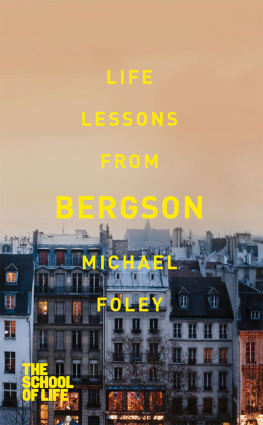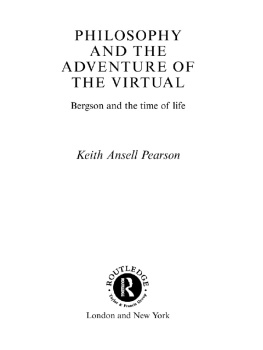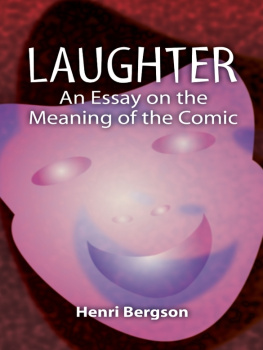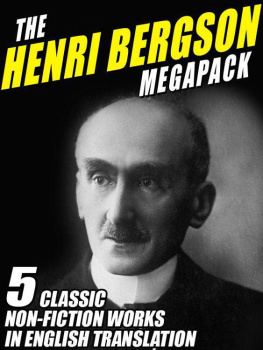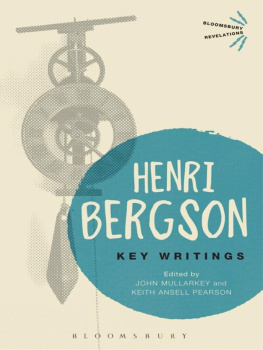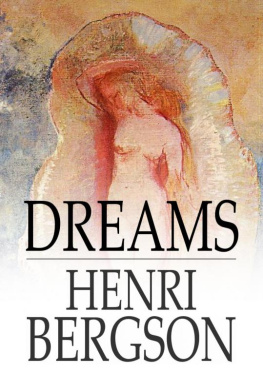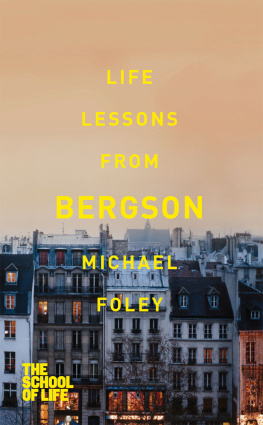Bergson Henri - Life lessons from Bergson
Here you can read online Bergson Henri - Life lessons from Bergson full text of the book (entire story) in english for free. Download pdf and epub, get meaning, cover and reviews about this ebook. year: 2013, publisher: Macmillan, genre: Science. Description of the work, (preface) as well as reviews are available. Best literature library LitArk.com created for fans of good reading and offers a wide selection of genres:
Romance novel
Science fiction
Adventure
Detective
Science
History
Home and family
Prose
Art
Politics
Computer
Non-fiction
Religion
Business
Children
Humor
Choose a favorite category and find really read worthwhile books. Enjoy immersion in the world of imagination, feel the emotions of the characters or learn something new for yourself, make an fascinating discovery.
- Book:Life lessons from Bergson
- Author:
- Publisher:Macmillan
- Genre:
- Year:2013
- Rating:3 / 5
- Favourites:Add to favourites
- Your mark:
- 60
- 1
- 2
- 3
- 4
- 5
Life lessons from Bergson: summary, description and annotation
We offer to read an annotation, description, summary or preface (depends on what the author of the book "Life lessons from Bergson" wrote himself). If you haven't found the necessary information about the book — write in the comments, we will try to find it.
Life lessons from Bergson — read online for free the complete book (whole text) full work
Below is the text of the book, divided by pages. System saving the place of the last page read, allows you to conveniently read the book "Life lessons from Bergson" online for free, without having to search again every time where you left off. Put a bookmark, and you can go to the page where you finished reading at any time.
Font size:
Interval:
Bookmark:
THE SCHOOL OF LIFE is dedicated to exploring lifes big questions: How can we fulfil our potential? Can work be inspiring? Why does community matter? Can relationships last a lifetime? We dont have all the answers, but we will direct you towards a variety of useful ideas from philosophy to literature, psychology to the visual arts that are guaranteed to stimulate, provoke, nourish and console.

About the Cover Image:The cover of this book features a typical block of buildings in Paris, the city where Bergson lived his whole life.
By the same author:
The Age of Absurdity
New and Selected Poems
Embracing the Ordinary
By Henri Bergson:
Essai sur les donnes immdiates de la conscience
Matire et mmoire
Le Rire
Lvolution cratrice
Lnergie spirituelle
Les Deux Sources de la morale et de la religion
La Pense et le mouvant
Mlanges
Key Writings
By William James:
The Dilemma of Determinism
What is an Emotion?
The Principles of Psychology
Psychology: The Briefer Course
The Will to Believe
On a Certain Blindness in Human Beings
Talks to Teachers
The Varieties of Religious Experience
The Energies of Men
The Letters of William James


First published 2013 by Macmillan
This electronic edition published 2013 by Macmillan
an imprint of Pan Macmillan, a division of Macmillan Publishers Limited
Pan Macmillan, 20 New Wharf Road, London N1 9RR
Basingstoke and Oxford
Associated companies throughout the world
www.panmacmillan.com
ISBN 978-1-4472-4698-5
Copyright Michael Foley 2013
Translated texts copyright Michael Foley 2013
Cover designed by Marcia Mihotich
Cover image Getty Images
The right of Michael Foley to be identified as the author of this work has been asserted by him in accordance with the Copyright, Designs and Patents Act 1988.
You may not copy, store, distribute, transmit, reproduce or otherwise make available this publication (or any part of it) in any form, or by any means (electronic, digital, optical, mechanical, photocopying, recording or otherwise), without the prior written permission of the publisher. Any person who does any unauthorized act in relation to this publication may be liable to criminal prosecution and civil claims for damages.
A CIP catalogue record for this book is available from the British Library.
Visit www.panmacmillan.com to read more about all our books and to buy them. You will also find features, author interviews and news of any author events, and you can sign up for e-newsletters so that youre always first to hear about our new releases.

In my youth, satirical humour seemed the most appropriate response to a venal world and this interest in the theory and practice of comedy led me to Henri Bergsons book Laughter: an Essay on the Meaning of the Comic. I was not entirely convinced by Bergsons theories but I liked his scathing comments on the stultifying effects of convention and social life, which he defined as an admiration of ourselves based on the admiration we think we are inspiring in others.
I poked around in the Bergson oeuvre but was disappointed. In his other work he displayed no satirical disgust or, despite the comedy book, wit, and his key work, Creative Evolution, proposed that the meaning of life was something called lan vital, which struck me as a vague, mystical concept. As a consequence of a scientific education, I respected only thinking that was hard-edged, logical and clear. For me, the intention of mysticism was to enshroud the world in mist.
So au revoir, Henri. I forgot about Bergson in the following decades of adult life, which was meant to comprise derisive laughter launched at the world from a rented garret but somehow turned out to be the conventional entanglements of mortgage, job, wife and child. Satire was no longer enough and I turned to thinkers like Erich Fromm, whose marvellous little book, The Art of Loving, helped me to make a go of marriage, whose The Sane Society taught me social and political awareness, and whose To Have and to Be taught me that religion might be of use to non-believers, and that Buddhism in particular might offer practical lessons.
Much later, I learned from the twentieth-century philosophy of mind that memory and the self are processes rather than fixed entities and suddenly this connected with the theories of particle physics, which claim that at the heart of matter there are in fact no particles but only processes. Then that connection made a further connection with the central Buddhist concept of no soul, no substance. And, in a thrilling Eureka moment, philosophy, science and religion came together in the revelation that everything is process... and everything is connected to everything else. Or, to be more precise, that the cosmos is a vast unity of interpenetrating and interdependent processes, a gigantic mega process made up of maxi processes themselves made up of mini processes composed of micro processes all the way in to the weird heart of matter and all the way out to the weird far end of our madly-expanding universe. And interacting with all this is the equally weird mega process of human consciousness, made up in turn of its own whirl of interpenetrating processes.
The concept that everything is process seemed to me an original insight, at least in Western thought. But my euphoria was soon tempered by the discovery that this was the central premise of process philosophy, a long-established and flourishing sub-genre with its own academic centres, professors and journals. On the other hand it was reassuring to discover that so many others shared the process view. I found that these ideas go back to Buddha and Heraclitus, who claimed that everything is fire and flow, and then it turned out that the true founder of modern process philosophy was none other than the thinker I had rejected so long before Henri Bergson. Substance is movement and change, he announced unequivocally. There are changes, but underneath the changes no things which change: change does not require a support. There are movements, but no inert or invariable object which moves: movement does not imply a mobile. The crucial thing, according to Bergson, was to accept this movement and become part of it: Philosophy can only be an effort to dissolve again into the Whole.
In other words, it is all about process and unity. Bonjour encore, Henri. But who was this guy?
Henri Bergson (18591941) was the second child of Michael Bergson, a Polish composer/pianist who came to Paris to make his name but never succeeded, and Kate Levinson, a Yorkshire woman of Irish descent. Both father and mother were devout Jews, but Henri abandoned religion at a young age, possibly a response to being left in a boarding school while his parents took the other children to England, never to return. This early isolation may account for his independence and reserve, profound distrust of social life and insistence on the need to create and protect a deep self.
Next pageFont size:
Interval:
Bookmark:
Similar books «Life lessons from Bergson»
Look at similar books to Life lessons from Bergson. We have selected literature similar in name and meaning in the hope of providing readers with more options to find new, interesting, not yet read works.
Discussion, reviews of the book Life lessons from Bergson and just readers' own opinions. Leave your comments, write what you think about the work, its meaning or the main characters. Specify what exactly you liked and what you didn't like, and why you think so.

